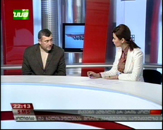Opposition downplay negotiations with government, vow to press for runoff
By Ana Datiashvili
Thursday, January 17

Neither side is saying much about the negotiations between acting president Nino Burjanadze and opposition leaders. Burjanadze was the first to confirm the talks, in comments to journalist on January 14. She spoke of eight issues on the table, but declined to go into details.
In his interview on the public broadcaster, Levan Gachechiladze, who was the opposition coalition’s presidential candidate, insisted the meetings with Burjanadze did not amount to negotiations.
“This is just talk and not negotiations,” Gachechiladze stated. They’ll continue the talks, he added, before pointedly saying that “talking doesn’t mean agreements.”
His comments may have sought to dispel fears from hardliner supporters that the opposition coalition is willing to back off on its demands in exchange for government concessions.
But Gachechiladze said his coalition would continue to push for a runoff in the presidential election, which they claim was rigged. Incumbent Mikheil Saakashvili officially won the January 5 election with 53.47 percent of the vote, avoiding a runoff by clearing the 50 percent mark by some 70 000 votes.
Most observer organizations deemed the election essentially fair, but noted many violations.
Opposition leaders say they have many issues beyond the public broadcaster to address with the government, but coalition member Goga Khaindrava made it clear the talks are not a signal of political reconciliation.
“We’re not going to talk to them like friends. There is the Central Election Commission, the courts and other things which were stolen by Saakashvili and his entourage from the Georgian nation—and we will take those and give them back to the people,” Khaindrava said yesterday.
Republican Davit Usupashvili, one of the opposition coalition’s representatives in the talks, shed some further light on the issues under discussion while speaking to journalists on January 15.
The opposition’s demands are much more than the eight Burjanadze mentioned, he said.
“We demand [the government] release illegally-held prisoners, stop political repression, form an objective and balanced Central Election Commission and place controls on law enforcers. There are many issues,” Usupashvili stated.
While at least two opposition parties not in the coalition, the Labor and New Rights parties, have joined coalition campaigners for street protests, their representatives say they will not take part in the talks.
New Rights member Manana Nachkebia said they received an offer to sit at the table, but insist on a runoff before beginning any dialogue.
The stance is unusual for the New Rights, which has typically been more moderate than most other opposition parties.
Labor representative Soso Shatberashvili said they will not enter talks with an “illegal government,” demanding first either a recount or new elections in two months’ time.
President-elect Saakashvili has said that he is ready for political dialogue with the opposition, and top state officials have spoken of creating posts for opposition leaders in the government.
Saakashvili is to be inaugurated on the steps of parliament on January 20. The opposition warn of a mass demonstration, but Tbilisi City Hall yesterday refused permission for a protest of the inauguration in the capital’s center.
